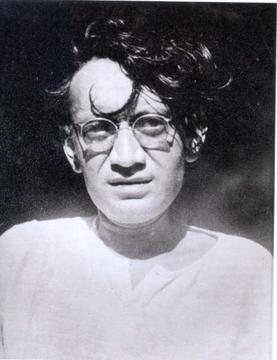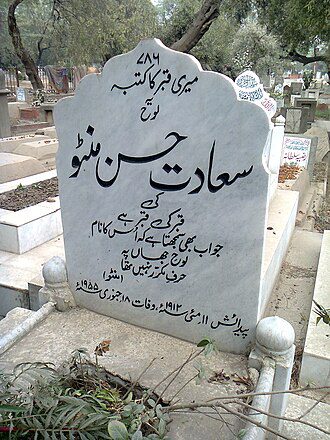Saadat Hasan Manto: A Life as Bold as His Words
Manto’s lifestyles, just like the tales he wrote, changed into both fascinating and tragically quick. Living for just 42 years, eight months, and 4 days, Manto spent most of his lifestyles on his personal phrases, regularly with little subject for societal norms. If the non-Urdu-speaking world pals Urdu poetry with Ghalib, then for fiction, their reference factor is absolutely Manto.
Born on May eleven, 1912, in Samrala, Ludhiana, right into a Kashmiri circle of relatives, Manto’s father, Maulvi Ghulam Hussain, changed into a choose by using profession. Manto become the son of his father’s 2nd wife and grew up in a household marked by using emotional distance. His father, a stern guy, had retired by the point Manto started out his schooling, leaving little room for affection. This strictness fueled Manto’s rebellious streak, which could later define his life and work.

Academically, Manto struggled. After failing matriculation twice, he subsequently handed within the third division however paradoxically failed in Urdu—a language he could later grasp. During his school years, he amused himself through spreading rumors and playing pranks. After matriculation, he changed into despatched to Aligarh, only to be expelled for allegedly having tuberculosis. Eventually, he enrolled in the FA program however spent greater time wandering than reading.
During this era, he fell into terrible conduct like gambling and ingesting, delivered to him by using a rich partner. Despite his restlessness, Manto’s life took a pivotal turn while he met Bari Alig, the editor of the mag Musawaat. Sensing Manto’s latent talent, Bari recommended him to go away at the back of the pulp novels of Tirtha Ram Firozpuri and explore the works of literary greats like Oscar Wilde and Victor Hugo. Under Bari’s mentorship, Manto translated Victor Hugo’s The Last Day of a Condemned Man into Urdu as Sarguzisht-e-Asir. The translation, completed in only two weeks, marked the beginning of Manto’s literary adventure.
Manto’s first brief story, Tamasha, became published in the inaugural difficulty of Khalq, incomes him recognition in literary circles.
Life in Bombay: The Writer Takes Center Stage
In 1935, Manto moved to Bombay, where his literary profession won momentum. His first task turned into on the weekly Paras, even though he received most effective a fraction of his promised earnings. Later, he have become the editor of Nazir Ludhianvi’s weekly Musawwir. During this era, Manto additionally labored for movie businesses like Imperial and Saroj and eventually joined Cine Tone with a month-to-month earnings of Rs. A hundred.
It turned into in Bombay that Manto married Safia, a Kashmiri lady he had in no way met earlier than. The marriage, arranged via his mother, was a quiet affair, without any of his loved ones attending due to strained own family family members. Even his sister, who changed into in Bombay at the time, refused to take part.
A Prolific however Controversial Career
In a profession spanning almost decades, Manto wrote 270 short testimonies, over one hundred radio performs, limitless movie scripts, and sketches of well-known personalities. His brutally sincere storytelling often stirred controversy, leading to several obscenity trials in both India and Pakistan. He turned into sentenced to 3 months in jail and fined Rs. 300 for his bold works, which fearlessly portrayed the darker aspects of human nature.
Manto’s particular fashion of disclosing society’s hypocrisies earned him both admirers and detractors. He often stated he did now not create imaginary characters however discovered the unpleasant truths of society by delving into the psychological and emotional depths of human lives.
Despite the controversies, Manto’s contributions to literature had been sooner or later diagnosed, and he changed into posthumously presented Pakistan’s maximum civilian honor, the Nishan-e-Imtiaz.
The Final Days
On January 17, 1955, Manto lower back home overdue within the night, simplest to fall gravely sick. After vomiting blood, a medical doctor become called, who advised immediate hospitalization. Manto refused, saying, “Don’t take me to the medical institution.” Later, he whispered to his nephew, “I actually have three and a half rupees in my coat pocket. Put a few cash in it and get me whiskey.”
Whiskey turned into introduced, but Manto’s circumstance worsened. An ambulance changed into known as, and a spoonful of whiskey changed into poured into his mouth, but he couldn’t swallow it. He became taken to the health center but surpassed away at the manner.

Legacy
Manto’s fearless writing shattered endless taboos, difficult societal ideals and exposing the uncooked, unfiltered truths of lifestyles. Even in dying, Manto remains an enduring symbol of defiance, his work celebrated for its honesty, humanity, and profound know-how of human nature.
سعادت حسن منٹو
سعادت حسن منٹو: ایک بے باک زندگی
منٹو کی زندگی، بالکل ان کہانیوں کی طرح جو انہوں نے لکھیں، دلچسپ اور افسوسناک طور پر مختصر تھی۔ صرف 42 سال، 8 ماہ اور 4 دن جینے والے منٹو نے زیادہ تر اپنی زندگی اپنے اصولوں کے مطابق گزاری، اور سماجی روایات کی پرواہ کم ہی کی۔ اگر غیر اردو بولنے والے لوگ اردو شاعری کو غالب سے جوڑتے ہیں، تو اردو افسانے کے لیے ان کا حوالہ یقیناً منٹو ہوتا ہے۔
سعادت حسن منٹو 11 مئی 1912 کو سمبڑالہ، ضلع لدھیانہ، ایک کشمیری خاندان میں پیدا ہوئے۔ ان کے والد، مولوی غلام حسین، پیشے کے لحاظ سے جج تھے۔ منٹو اپنے والد کی دوسری بیوی سے تھے اور ایسے گھرانے میں پروان چڑھے جہاں جذباتی فاصلہ تھا۔ ان کے والد سخت گیر انسان تھے اور منٹو کی تعلیم شروع ہونے تک ریٹائر ہو چکے تھے، جس کے باعث والدین کی شفقت کی کمی رہی۔ ان کے والد کی سختی نے منٹو کے اندر بغاوت کی روح پیدا کی، جو ان کی زندگی اور کام میں نمایاں رہی۔
تعلیمی میدان میں، منٹو کو مشکلات کا سامنا رہا۔ دو بار میٹرک میں ناکام ہونے کے بعد، وہ تیسری جماعت میں پاس ہوئے لیکن اردو میں فیل ہو گئے، جو بعد میں ان کی پہچان بن گئی۔ اسکول کے دنوں میں، منٹو کا مشغلہ افواہیں پھیلانا اور لوگوں کو بیوقوف بنانا تھا۔ میٹرک کے بعد انہیں علی گڑھ بھیجا گیا، لیکن تپ دق کے الزام میں نکال دیا گیا۔ آخرکار، انہوں نے ایف اے میں داخلہ لیا، لیکن پڑھائی سے زیادہ آوارہ گردی میں وقت گزارا۔
اس دوران، وہ جوا اور شراب جیسے برے عادتوں کا شکار ہو گئے، جو انہیں ایک امیر دوست نے سکھائی تھیں۔ ان کی بے قراری کے باوجود، ان کی زندگی نے اس وقت نیا موڑ لیا جب وہ باری علیگ سے ملے، جو رسالہ مساوات کے مدیر تھے۔ باری علیگ نے منٹو کی چھپی ہوئی صلاحیتوں کو پہچانا اور انہیں ترہت رام فیروز پوری کے پپ کہانیوں سے ہٹا کر آسکر وائلڈ اور وکٹر ہیوگو جیسے ادیبوں کا مطالعہ کرنے کی ترغیب دی۔ باری صاحب کی رہنمائی میں، منٹو نے وکٹر ہیوگو کی کتاب دی لاسٹ ڈے آف اے کنڈیمڈ مین کا اردو میں سرگزشتِ اسیر کے نام سے ترجمہ کیا، جو دو ہفتوں میں مکمل ہوا۔ یہ ترجمہ منٹو کے ادبی سفر کا آغاز ثابت ہوا۔
منٹو کی پہلی کہانی تماشا، رسالہ خلق کے پہلے شمارے میں شائع ہوئی، جس سے انہیں ادبی حلقوں میں پہچان ملی۔
بمبئی کی زندگی: ایک مصنف کی پہچان
1935 میں، منٹو بمبئی منتقل ہو گئے، جہاں ان کا ادبی کیریئر پروان چڑھا۔ ان کی پہلی ملازمت ہفتہ وار رسالہ پارس میں تھی، لیکن انہیں وعدے کے مطابق مکمل تنخواہ نہیں ملی۔ بعد میں، وہ نذیر لدھیانوی کے ہفتہ وار رسالہ مصور کے مدیر بنے۔ اس دوران، منٹو نے فلم کمپنیوں جیسے امپیریل اور سروچ کے لیے بھی کام کیا اور آخرکار سینے ٹون میں 100 روپے ماہانہ پر ملازمت حاصل کی۔
یہیں بمبئی میں، منٹو کی شادی صفیہ نامی کشمیری لڑکی سے ہوئی، جنہیں انہوں نے کبھی نہیں دیکھا تھا۔ یہ شادی ان کی والدہ کے اصرار پر ہوئی، اور خاندان کے ساتھ کشیدہ تعلقات کے باعث رشتہ داروں میں سے کسی نے شرکت نہیں کی۔ ان کی بہن، جو اس وقت بمبئی میں موجود تھیں، نے بھی شادی میں شرکت نہیں کی۔
ایک زرخیز لیکن متنازعہ کیریئر
تقریباً 20 سالہ ادبی زندگی میں، منٹو نے 270 مختصر کہانیاں، 100 سے زیادہ ریڈیو ڈرامے، بے شمار فلمی اسکرپٹ، اور مشہور شخصیات کے خاکے لکھے۔ ان کی بے باک حقیقت نگاری نے کئی بار تنازع کھڑا کیا، اور انہیں ہندوستان اور پاکستان دونوں میں فحاشی کے الزامات کا سامنا کرنا پڑا۔ ان کے جراتمندانہ کاموں پر انہیں 3 ماہ قید اور 300 روپے جرمانہ کیا گیا۔
منٹو نے کہا کہ وہ خیالی کردار تخلیق نہیں کرتے بلکہ معاشرے کے بدصورت حقائق کو آشکار کرتے ہیں، انسانوں کی نفسیاتی اور جذباتی گہرائیوں کو بیان کرتے ہیں۔
تنازعات کے باوجود، منٹو کی ادبی خدمات کو تسلیم کیا گیا، اور انہیں پاکستان کے اعلیٰ ترین سول ایوارڈ، نشانِ امتیاز سے نوازا گیا۔
آخری دن
17 جنوری 1955 کو، منٹو دیر رات گھر لوٹے اور شدید بیمار ہو گئے۔ خون کی الٹی کے بعد، ڈاکٹر کو بلایا گیا، جس نے فوراً اسپتال لے جانے کا مشورہ دیا۔ منٹو نے انکار کرتے ہوئے کہا، “مجھے اسپتال مت لے جاؤ۔” بعد میں، انہوں نے اپنے بھتیجے سے کہا، “میرے کوٹ کی جیب میں ساڑھے تین روپے ہیں۔ اس میں کچھ پیسے ڈال کر میرے لیے شراب لے آؤ۔”
شراب منگوائی گئی، لیکن ان کی حالت مزید خراب ہو گئی۔ ایمبولینس بلائی گئی، اور ان کے منہ میں شراب ڈالی گئی، لیکن وہ اسے نگل نہ سکے۔ انہیں اسپتال لے جایا گیا، لیکن راستے میں ان کا انتقال ہو گیا۔
وراثت
منٹو کی بے خوف تحریروں نے بے شمار سماجی ممنوعات کو توڑا، روایتی عقائد کو چیلنج کیا، اور زندگی کی کڑوی سچائیوں کو بے نقاب کیا۔ مرنے کے بعد بھی، منٹو بغاوت کی علامت بنے رہے، ان کا کام اپنی دیانتداری، انسانیت، اور گہرائی کے لیے ہمیشہ یاد رکھا جاتا ہے۔






